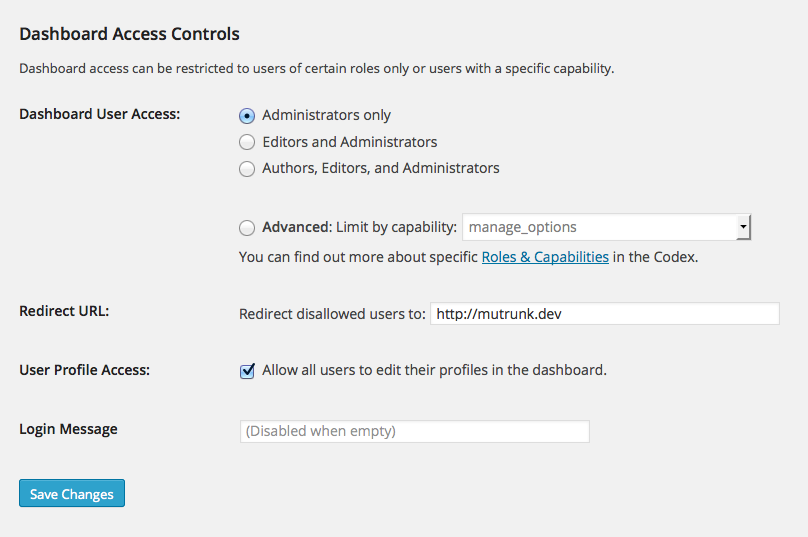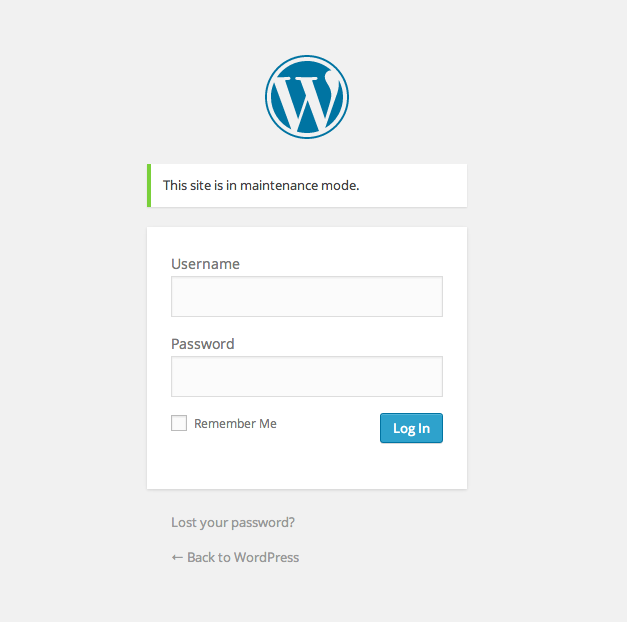
Remove Dashboard Access Plugin
Disable Dashboard access for users of a specific role or capability. Disallowed users are redirected to a chosen URL. Get set up in seconds.
The easiest and safest way to restrict access to your WordPress site’s Dashboard and administrative menus. Remove Dashboard Access is a lightweight plugin that automatically redirects users who shouldn’t have access to the Dashboard to a custom URL of your choosing. Redirects can also be configured on a per-role/per-capability basis, allowing you to keep certain users out of the Dashboard, while retaining access for others.
- Limit Dashboard access to user roles:
- Admins only
- Admins + editors
- Admins, editors, and authors
- or restrict by specific user capability
- Choose your own redirect URL
- Optionally allow users to edit their profiles
- Display a message on the login screen so users know why they’re being redirected
Blocking access to the Dashboard is a great way to prevent clients from breaking their sites, prevent users from seeing things they shouldn’t, and to keep your site’s backend more secure.
Allow only users with roles or capabilities:
You can restrict Dashboard access to Admins only, Editors or above, Authors or above, or by selecting a specific user capability.
Grant access to user profiles:
Optionally allow all users the ability to edit their profiles in the Dashboard. Users lacking the chosen capability won’t be able to access any other sections of the Dashboard.
Show a custom login message:
- Supply a message to display on the login screen. Leaving this blank disables the message.
Installation
- Search ‘Remove Dashboard Access’ from the Install Plugins screen.
- Install plugin, click Activate.
Screenshots
FAQ
Users lacking the chosen capability or role(s) will be redirected to the URL set in Settings > Dashboard Access.
The Toolbar contains certain important links (even for disallowed users) such as for accessing to the profile editor and/or logging out. Plus, there are many plugins out there for disabling the Toolbar if you really want to.
No. Disable the plugin if you don’t wish to leverage the functionality.
- Remove Dashboard Access removes some built-in WordPress Toolbar menus by default, but can be extended to hide menus from other plugins or themes via two filters:
rda_toolbar_nodes(viewing from the admin), andrda_frontend_toolbar_nodes(viewing from the front-end).
- In the HTML page source, look for the
<li>container for the menu node you’re targeting. It should take the form of<li id="wp-admin-bar-SOMETHING"> - In
<li id="wp-admin-bar-SOMETHING">, you want the “SOMETHING” part.
The function returns an associative array with $pagenow as the key and a nested array of key => value pairs where the key is the $_GET parameter and the value is the allowed value.
Example: If you want to allow a URL of tools.php?page=EXAMPLE, there are three parts to know:
- The
$pagenowglobal value (tools.phpin this case) - The
$_GETkey (pagein this case) - The
$_GET value (EXAMPLE in this case)
Here is how we would add that URL to the allowlist:
/** * Allow users to access a page with a URL of tools.php?page=EXAMPLE * * @param array $pages Allowed Dashboard pages. * @return array Filtered allowed Dashboard pages. */ function wpdocs_allow_example_dashboard_page( $pages ) { // If the $pages array doesn't contain the 'tools.php' key, add it. if ( ! isset( $pages['tools.php'] ) ) { $pages['tools.php'] = array(); } // Now add `?page=EXAMPLE` combination to the allowed parameter set for that page. $pages['tools.php'][] = array( 'page' => 'EXAMPLE' ); return $pages; } add_filter( 'rda_allowlist', 'wpdocs_allow_example_dashboard_page' ); /** * Filter hidden Toolbar menus on the front-end. * * @param array $ids Toolbar menu IDs. * @return array Filtered front-end Toolbar menu IDs. */ function wpdocs_hide_some_toolbar_menu( $ids ) { $ids[] = 'SOMETHING'; return $ids; } add_filter( 'rda_frontend_toolbar_nodes', 'wpdocs_hide_some_toolbar_menu' ); Common plugin Toolbar menus and their ids:
- Jetpack by WordPress.com (notifications) – ‘notes’
- WordPress SEO by Yoast – ‘wpseo-menu’
- W3 Total Cache – ‘w3tc’
To view debugging information on the Settings > Reading screen, visit:
example.com/options-general.php?page=dashboard-access&rda_debug=1 Yes! This plugin is in active development on GitHub. Pull requests are welcome!
Yes. The plugin does not collect any personal data, nor does it set any cookies.
Changelog
1.2 on January 29, 2024
- Confirmed compatibility with WordPress 6.4.2
- New: Added a new filter,
rda_allowlist, to configure pages that should be accessible to all users, regardless of their capabilities or roles (see FAQ for usage) - Improved: Added a description that clarifies that the Login Message is only displayed on the WordPress “Log In” screen
- Improved: The User Profile Access text is now a proper label for the checkbox
- Fixed: Allow access to the Wordfence 2FA configuration page (#33)
- Fixed: Text domain not properly set for translations (thanks @fierevere)
- Tweak: Prevent directly accessing PHP files by checking for
ABSPATH(#26) - Tweak: Prevent browsing directories on poorly-configured servers by adding
index.phpfiles in plugin directories
1.1.4 & 1.1.5 on April 18, 2022
Remove Dashboard Access is now being maintained by TrustedLogin! Remove Dashboard Access aligns with what we do at TrustedLogin: simply making WordPress more secure. Email any questions to [email protected].
- Fixed: Deactivating and activating the plugin will no longer overwrite plugin settings
- Fixed: Deprecated function
screen_icon()warning - Fixed: Issue when front-end editing of profiles when the
$pagenowglobal is not defined (#24) - Fixed: Potential
Invalid argument supplied for foreach()PHP warning (#22)
1.1.3
- Fixed a compatibility issue with bbPress and the media grid view.
1.1.2
- Bump tested-up-to to 4.1.0
- Miscellaneous readme changes.
1.1.1
Bug Fix:
- Move options back to Settings > Dashboard Access screen to resolve conflict with page_on_front UI.
1.1
Enhancements:
- Instantiate as a static instance for better modularity
- Move Dashboard Access Controls settings to Settings > Dashboard Access
- Add optional login message option
- Add better settings sanitization
- New Filter:
rda_default_caps_for_role– Filter default roles for Admins, Editors, and Authors - New Debug Mode
Bug Fixes:
- Remove unnecessarily stringent URL mask on the redirect URL option
1.0
- Complete rewrite!
- New: Limit dashboard access for Admins only or by capability
- New: Allow/disallow edit-profile access
- New: Choose your own redirect URL
- New Filter:
rda_default_access_cap– Change default access capability - New Filter:
rda_toolbar_nodes– Filter which back-end Toolbar nodes are hidden - New Filter:
rda_frontend_toolbar_nodes– Filter which front-end Toolbar nodes are hidden
0.4
- Refined DOING_AJAX check for logged-out users, props @nacin and @BoiteAWeb
0.3
- Changed cap to manage_options, replaced PHP_SELF with DOING_AJAX
0.2
- Replaced preg_match with admin-ajax test. Added compatibility with rewritten dashboard URLs.
0.1
- Submitted to repository


